(Updated Feb 2021 to include Local Search Grid competitor GBP tracking)
If you’re wondering who your competitors are, what their local SEO strategies are, and if there’s a gap in the market for you to exploit, then you’ve come to the right place.
In this overview, we’re to show you how to use BrightLocal’s tools to map your competitive landscape, perform detailed local competitor analysis, and pinpoint opportunities for growth.
The five BrightLocal tools to help you crush your competitors are:
- Google Business Profile Audit
- Local Rank Tracker report
- Citation Tracker report
- Local Search Audit
- Local Search Grid
Let’s take a look at a Google Business Profile Audit first.
1. Tracking Your Competitors with a Google Business Profile Audit
A Google Business Profile Audit lets you quickly assess the status of your Google Business Profile and how it compares to your top online competitors.
It uses your business location and business type to identify the competitors which are ranking top in the local pack for the search terms and search the location you’ve chosen.
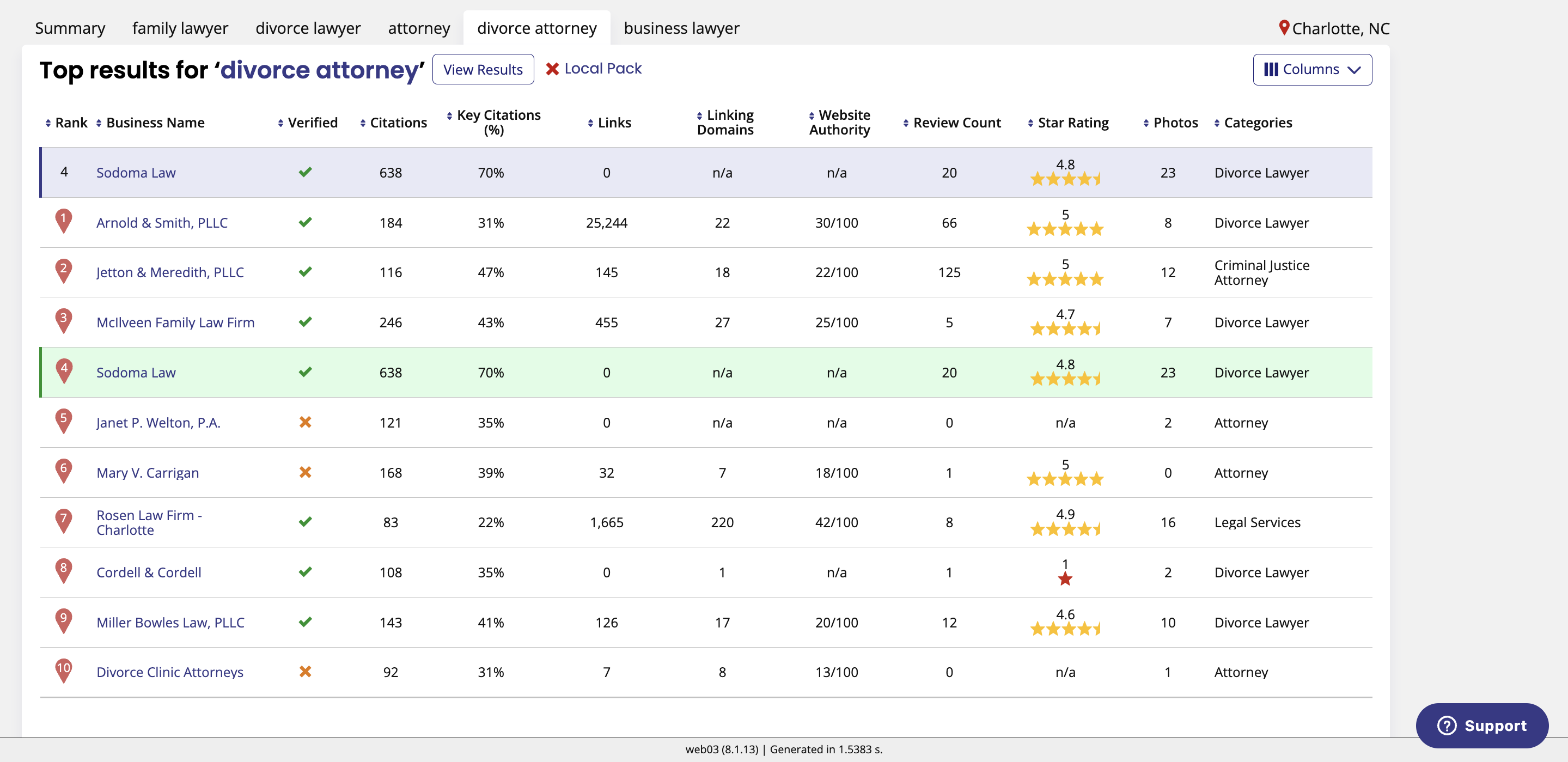
The audit is split into corresponding search terms based on your business type and reveals nuggets of information about your competitors such as:
- the number of citations, links, and reviews they have
- their star ratings and number of photos on Google
- the primary business category they’re using
- their website authority
This data is benchmarked against your own so you can see the areas that may be helping their search rankings that you may not have focused on, giving you some really actionable insights.
For instance, in the Google Business Profile Audit report below, we can see that Sodoma Law is ranking in fourth position for the search term ‘divorce attorney’. We can also see that Arnold & Smith, Jetton & Meredith PLLC, and McIlveen Family Law Firm are their three main competitors because they rank in first, second, and third positions, respectively.
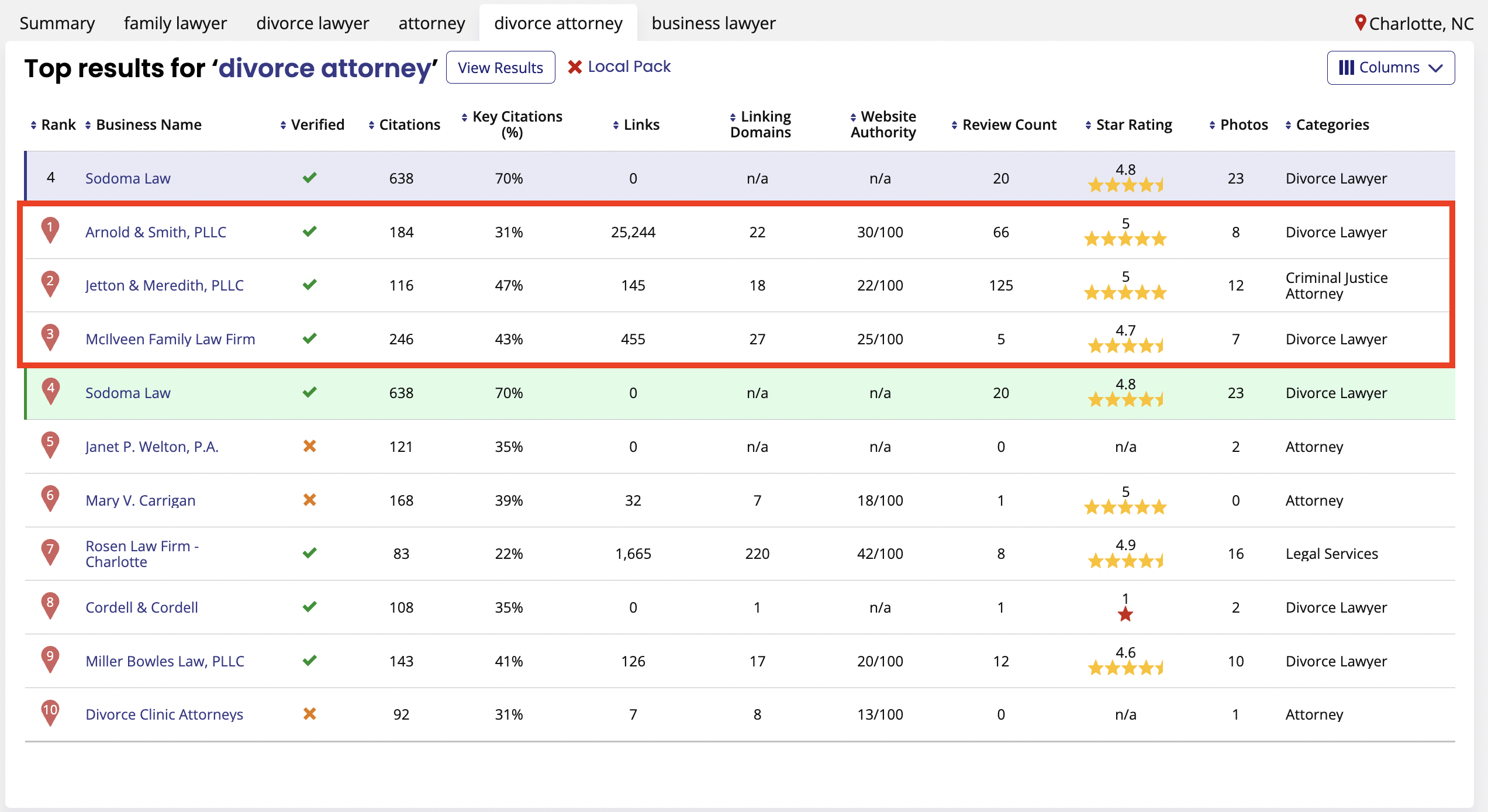
Working our way across the table, we can see that Sodoma Law has more citations than the top three companies, but far fewer links. So, to try to rank higher for the search term divorce attorney, they need to gain more high-quality links.
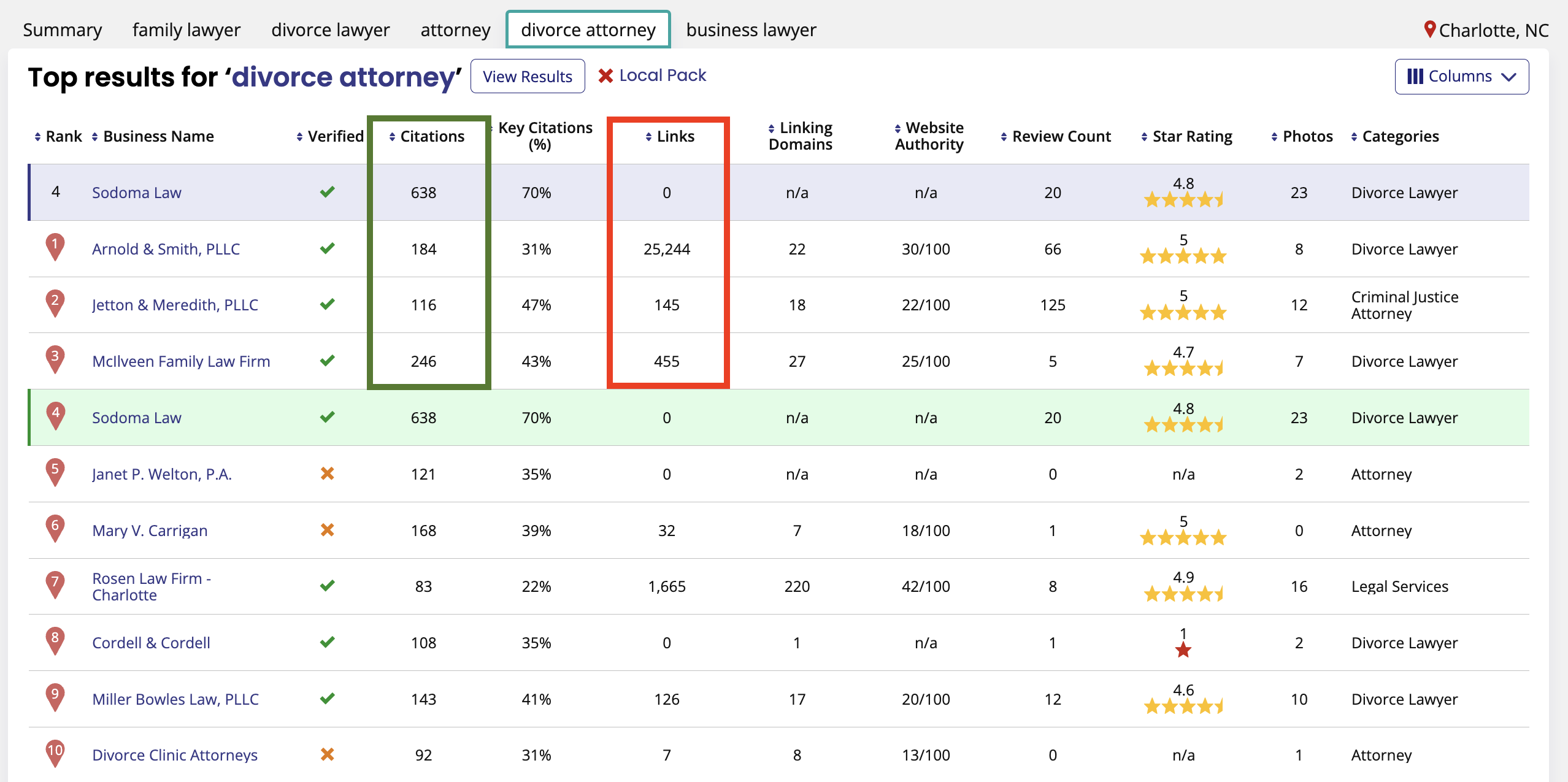
See the below Help Center articles for more information on setting up and understanding a Google Business Profile Audit report:
- Google Business Profile Audit Help Center
- How to create a Google Business Profile Audit report
- How to understand the Google Business Profile Audit
2. Tracking Your Competitors with a Local Rank Tracker Report
Next on the list is a Local Rank Tracker report. This is a great way to see how your rankings benchmark against your competitors.
To track your competitors in a Local Rank Tracker report, you can add a maximum of four competitors to the section called ‘Monitor competitor search rankings’ when you set it up.

If your report is already set up, you can add competitors by going to ‘Actions’, selecting ‘Edit Report’, and then scrolling down to the Advanced Settings section where you can click on the ‘Competitors’ tab.
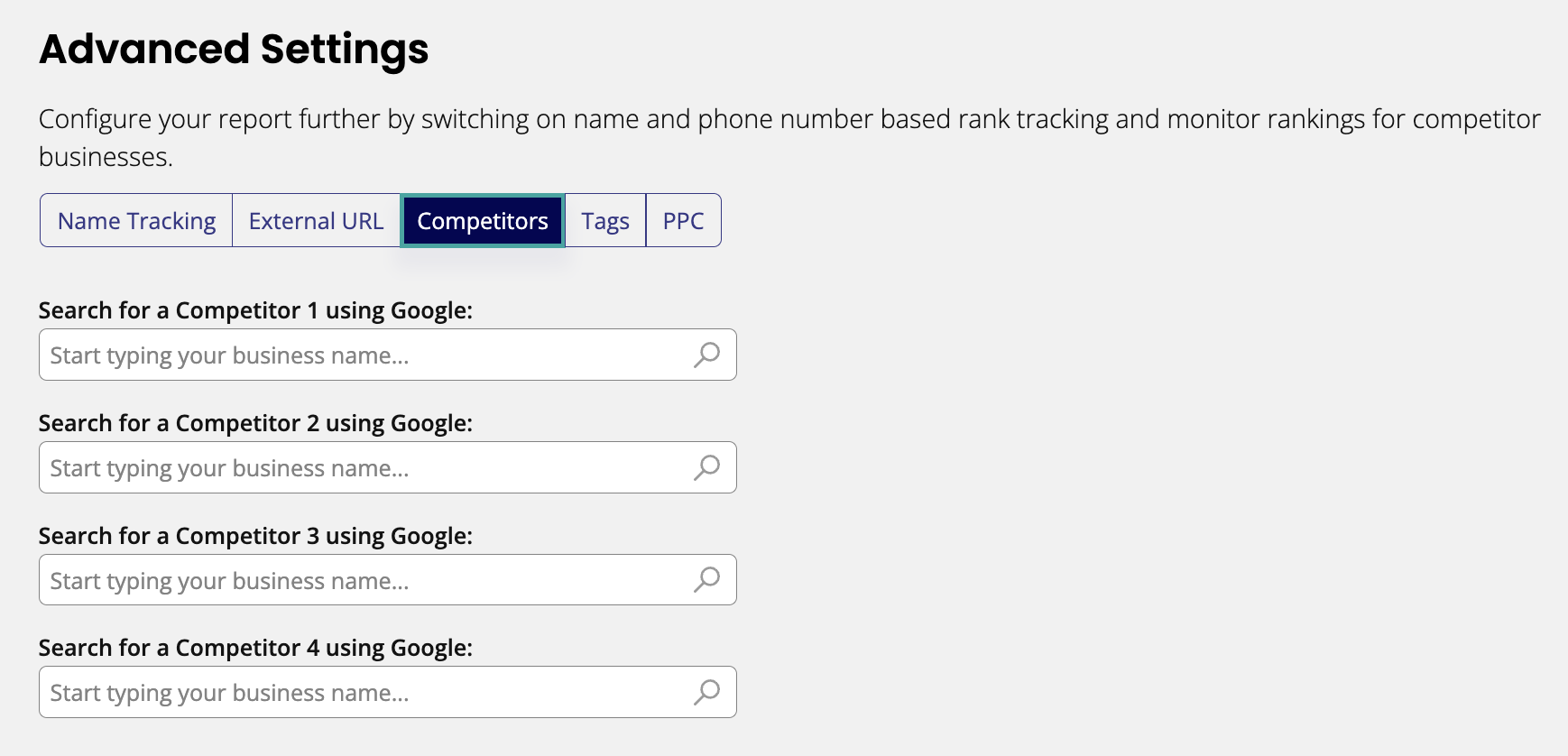
Not sure who your competitors are? The best way to learn is to search for a term related to your business, such as ‘lawyers Charlotte NC’, and see who appears in the local pack or ahead of you in terms of their local positioning.

When your report is finished, there will be an additional tab called ‘Chosen Competitors’ where you can see how your competitors rank for different keywords in the different search engines.
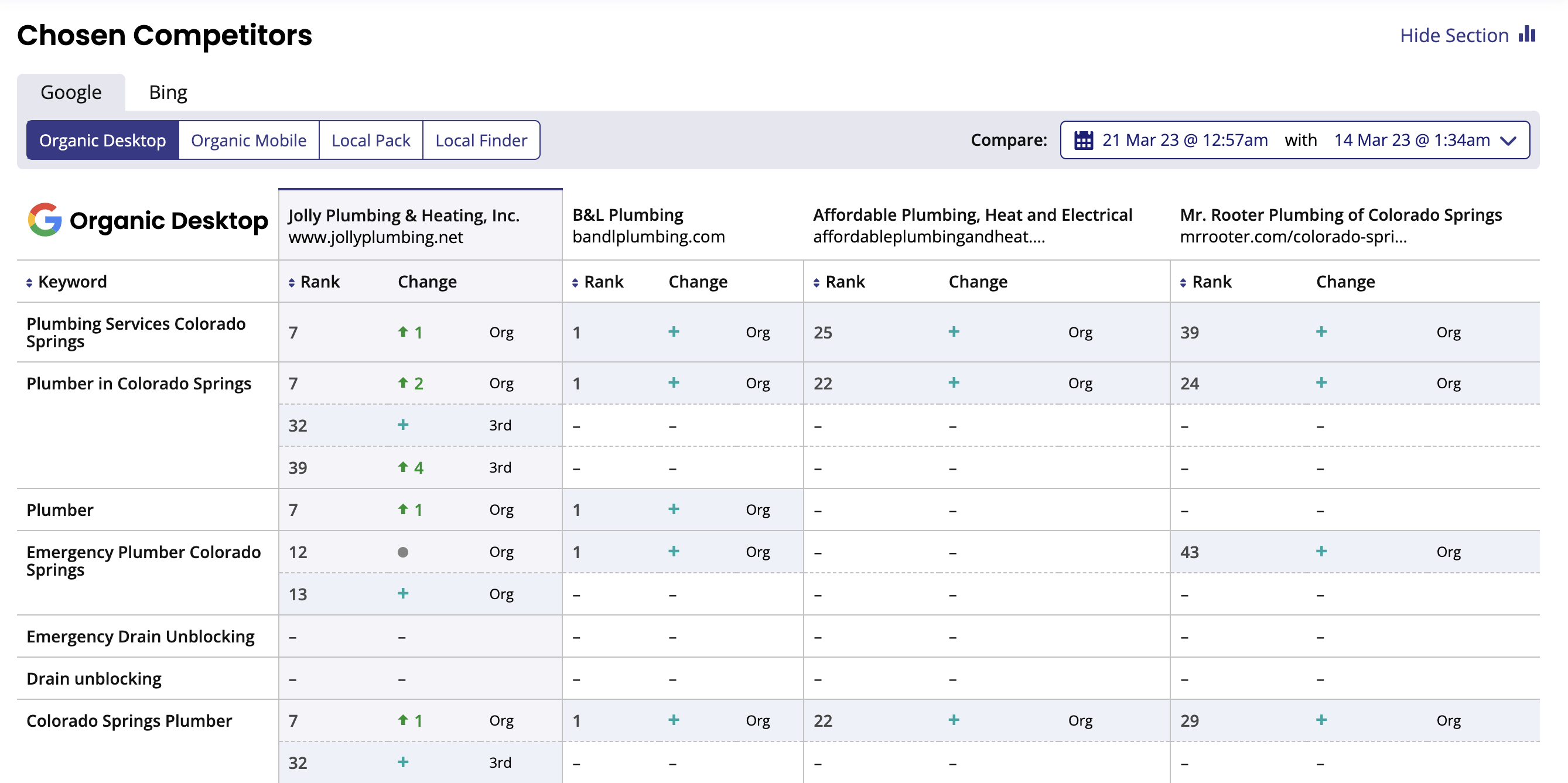
For example, the image above shows where Jolly Plumbing & Heating ranks for certain keywords on Google Organic Desktop. In the Rank column, the numbers show their overall ranking position on Google. A dash means we didn’t find any mention of the business in the top 50 results.
This plumber currently ranks 7th for the keyword ‘Plumbing Services Colorado Springs’. One of their competitors ranks 1st. To bump this competitor off their top spot they will need to include the keywords ‘Plumbing Services Colorado Springs’ throughout their content.
See the below Help Center articles for more information on setting up and understanding a Local Rank Tracker report:
- Local Rank Tracker Help Center
- How to create a Local Rank Tracker report
- How to understand a Local Rank Tracker report
3. Tracking Your Competitors with a Citation Tracker Report
Third on the list is the Citation Tracker report, which lets you monitor competitor citations and helps you to fill any gaps. We find the competitors by looking for what businesses are ranking top in Google Maps for the business type + location (e.g. plumbers in manhattan).
Once you’ve run your Citation Tracker report, you’ll see a tab called Competitor Citations. Here you’ll be able to see a list of citations and business mentions that your top five competitors in search have, excluding any that you already have.
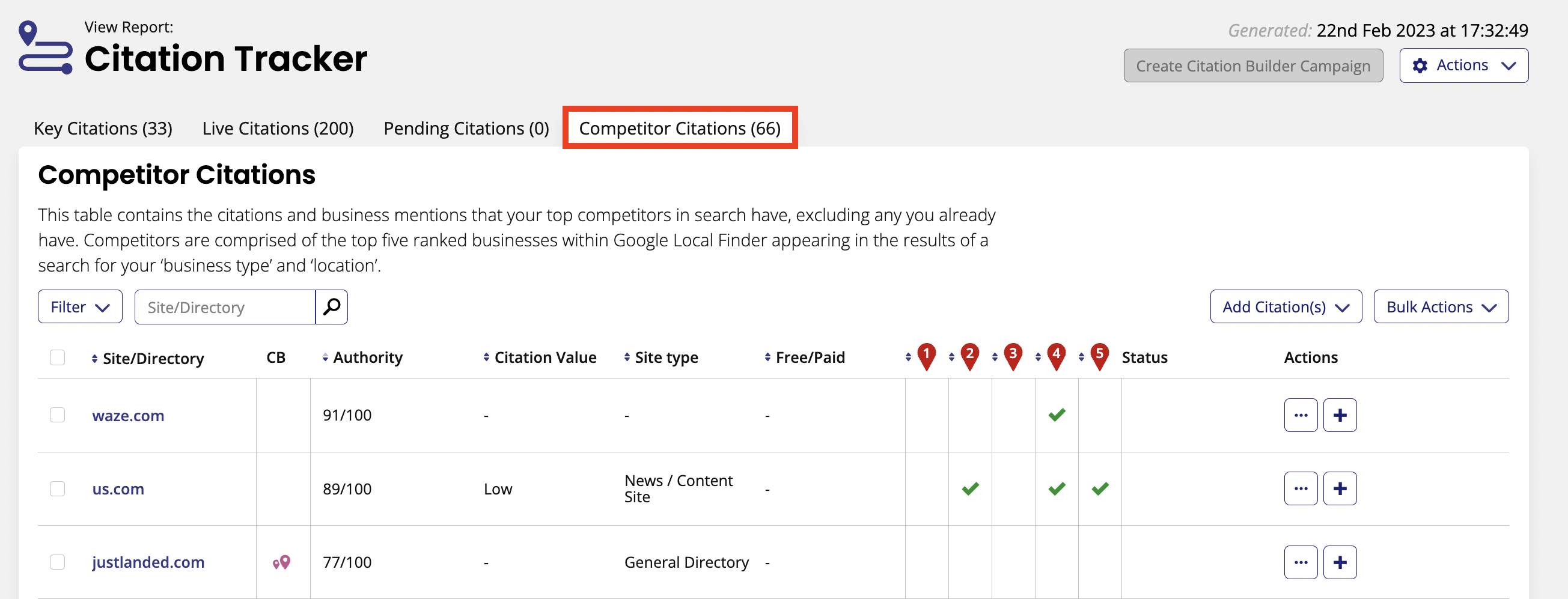
To discover who your competitors are, simply click on the red pins.
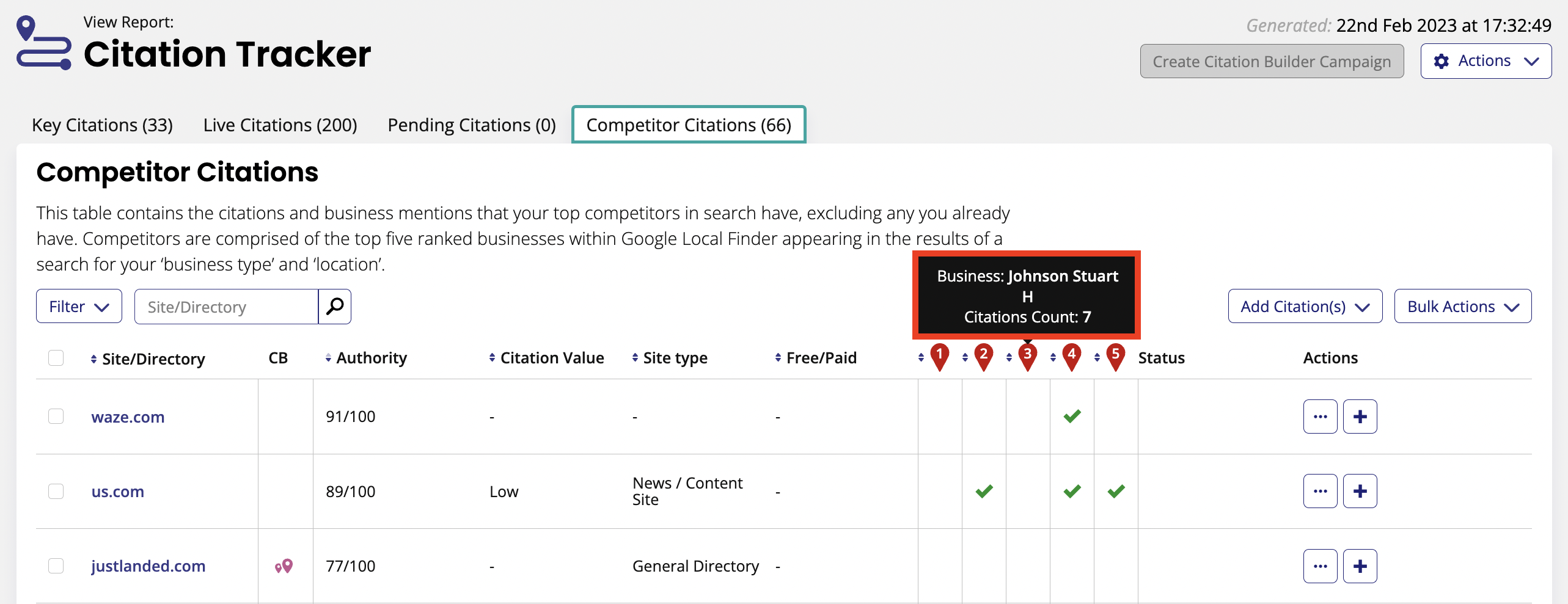 For a better understanding of the citations that are worth you registering for, take a look at the Citation Authority and Citation Value columns.
For a better understanding of the citations that are worth you registering for, take a look at the Citation Authority and Citation Value columns.
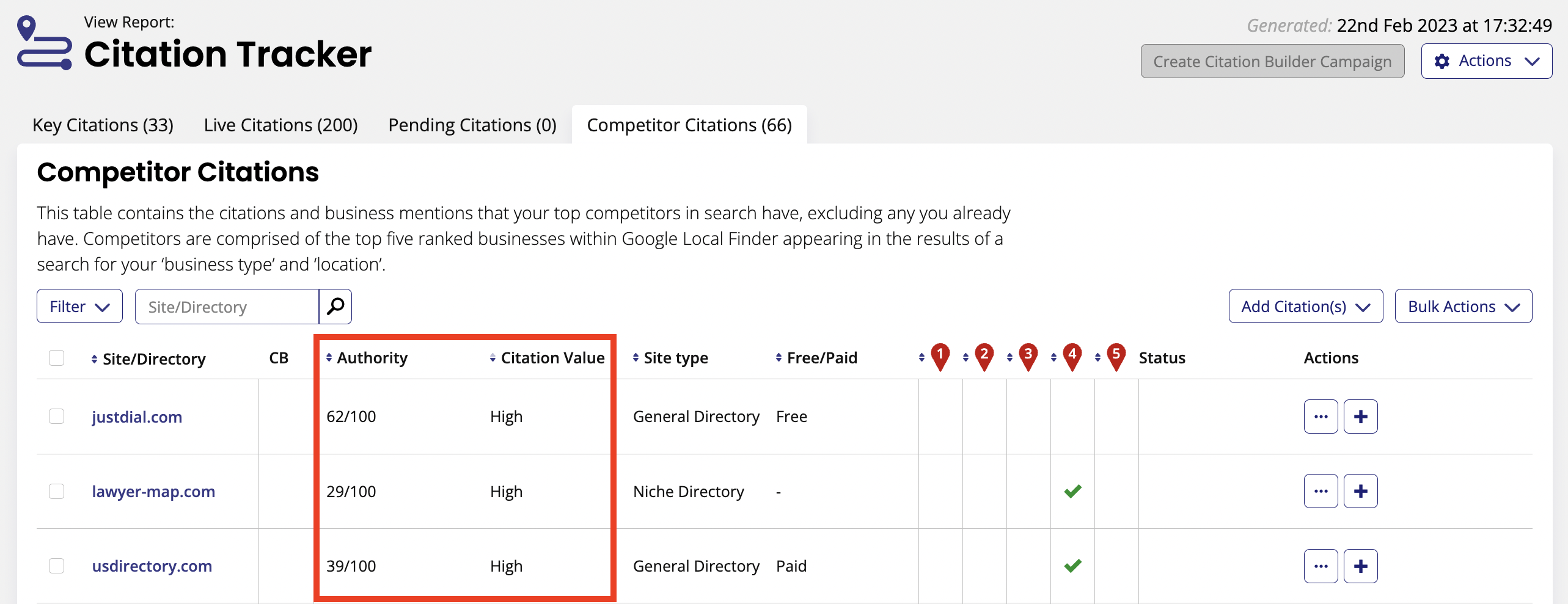
Citation Authority is based on Domain Authority, a metric calculated by Moz. It’s the SEO score for a website and a prediction of its ability to rank well in search engines. This is calculated out of 100. The higher the number, the more influence that site may have.
Citation Value is unique to BrightLocal. It’s determined using the frequency with which a website appears in citation records. The more a website is used as a citation source, the higher its value. These values are calculated from unique research conducted by BrightLocal.
If there are any citations in the table that have high Citation Value and/or Citation Authority scores, they would be good to go after first.
To do that, in the column called ‘Actions’, click the ‘+’ icon and you’ll be taken straight to the citation site. Once there, you should be able to fill in your business details to register a citation request. Keep in mind that your citation may not be added to a directory immediately.
Alternatively, check out Citation Builder, where we do the hard work for you by building citations on key sites, cleaning up your existing citations, and removing harmful duplicates.
See the below Help Center articles for more information on setting up and understanding a Citation Tracker report:
- Citation Tracker Help Center
- How to create a Citation Tracker report
- How to understand your Citation Tracker report
4. Tracking Your Competitors with a Local Search Audit
Another great source of competitor information in BrightLocal is a Local Search Audit.
In a Local Search Audit, under the ‘Links & Website Authority’ heading, you’ll find the average score for your competitors, as well as your business scores on the following:
- Google Index Count: the number of pages that Google has indexed on your site
- Link Count: the number of links that lead from other websites through to yours
- Linking Domains: the number of websites that link to your website
- Majestic C Flow: a link-related score that’s calculated based on the number of inbound links your website has
- Domain Authority: a search engine ranking score that predicts your website’s ability to rank on search engine results pages
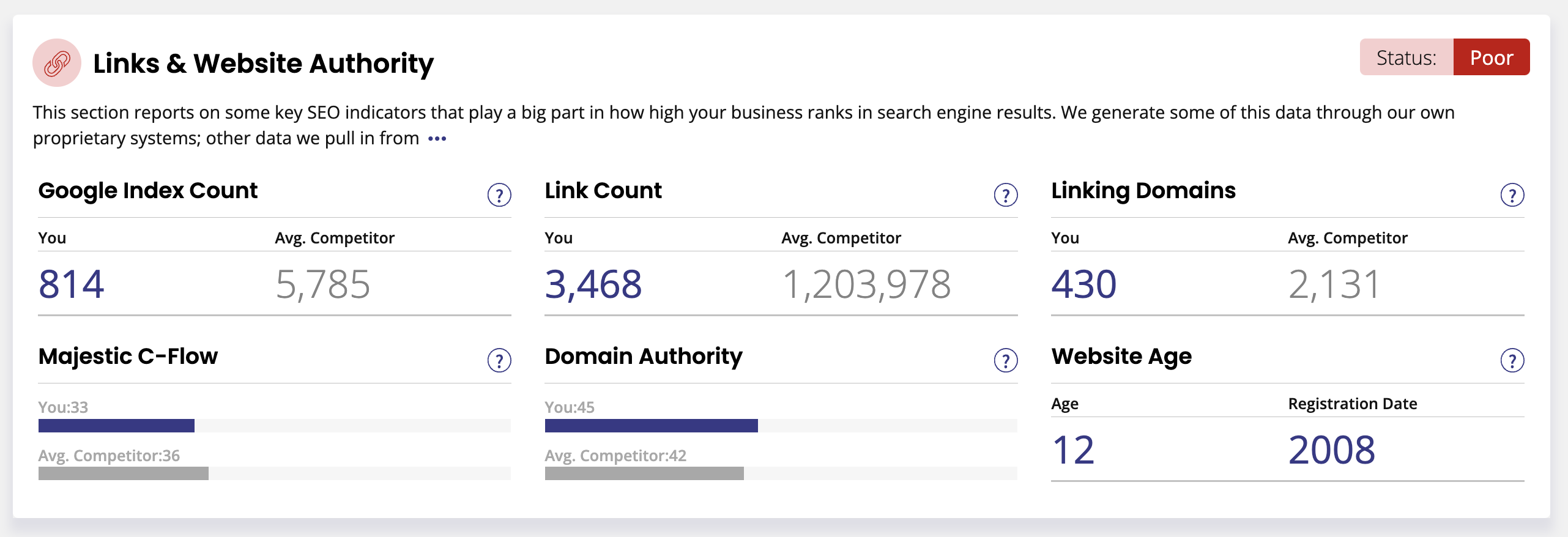
Your aim should be to rank higher than the competitor average for each of these, so this table gives you great insight into where you might want to prioritize your efforts first and in the future.
For example, if your number of Linking Domains is below your competitor average, then reaching out to trusted websites and asking them to link back to yours would be a good place to start.
See the below Help Center articles for more information on setting up and understanding a Local Search Audit:
- Local Search Audit Help Center
- How to create a Local Search Audit
- How to understand a Local Search Audit
5. Tracking Your Competitors with a Local Search Grid Report
Local Search Grid tells you how well you’re ranking for specific keywords compared to your competitors, giving you an idea of who you’re actually competing against so you can start to build a strategy for improvement.
In the ‘Overall’ competitors table you will see:
- Avg Rank: the competitor’s average ranking score
- Links: the number of backlinks the competitor has (according to Moz) that point to the web domain listed as the website on their Google My Business listing
- Authority: a measure taken from Moz. The higher the Authority score the higher the ranking potential of the competitor’s website
- Reviews: the number of customer reviews the competitor has
- Rating: the competitor’s average star rating
- Category: the primary category a competitor is using in their Google My Business profile
So, for example, if you saw that you had more reviews and a similar star rating to your top three competitors, but that your Category was different, then changing that within your Google Business Profile might help to improve your rankings.
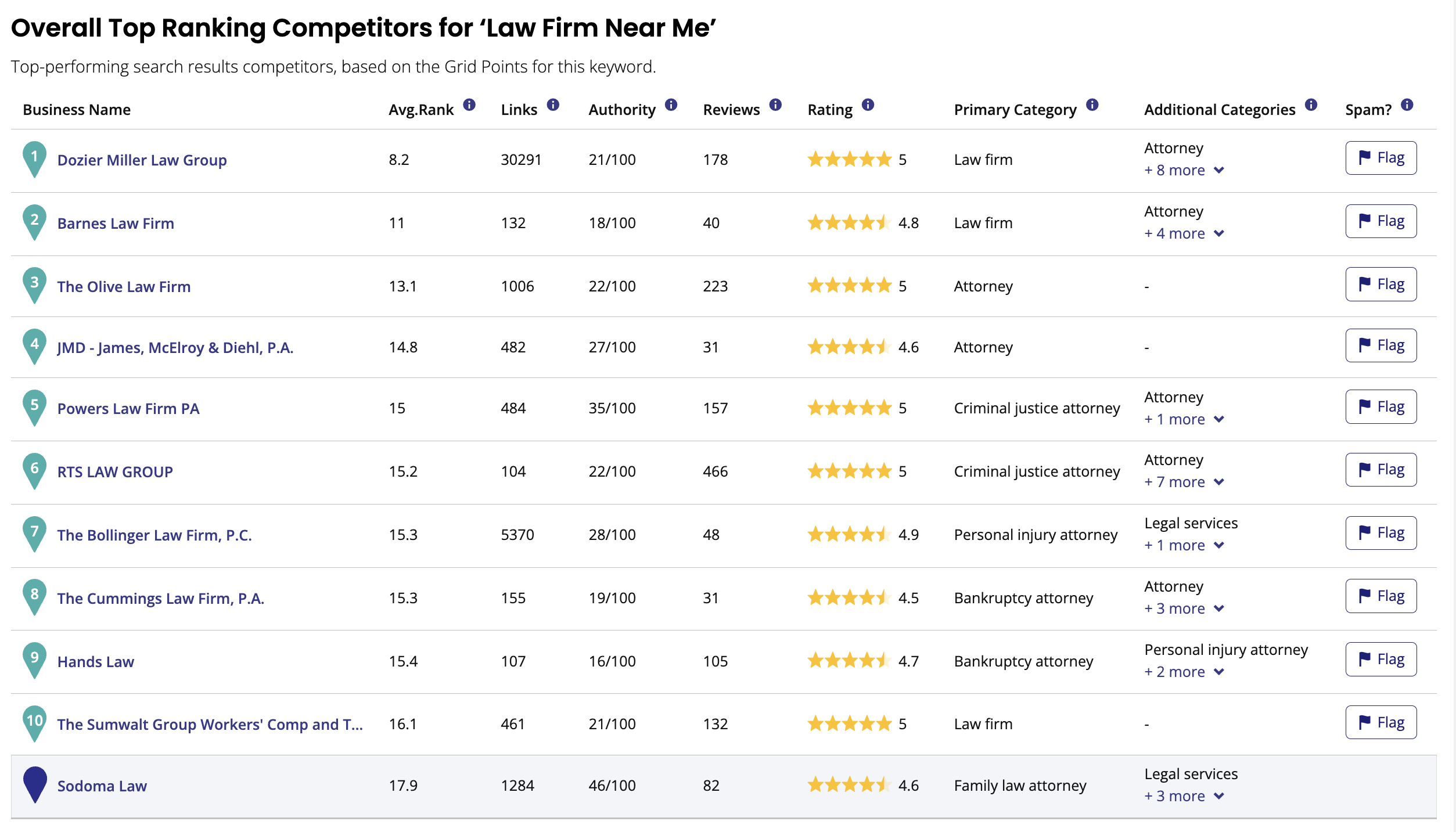
For a side-by-side comparison and to see a competitor’s rankings on a grid, simply click on a competitor’s name in the table.
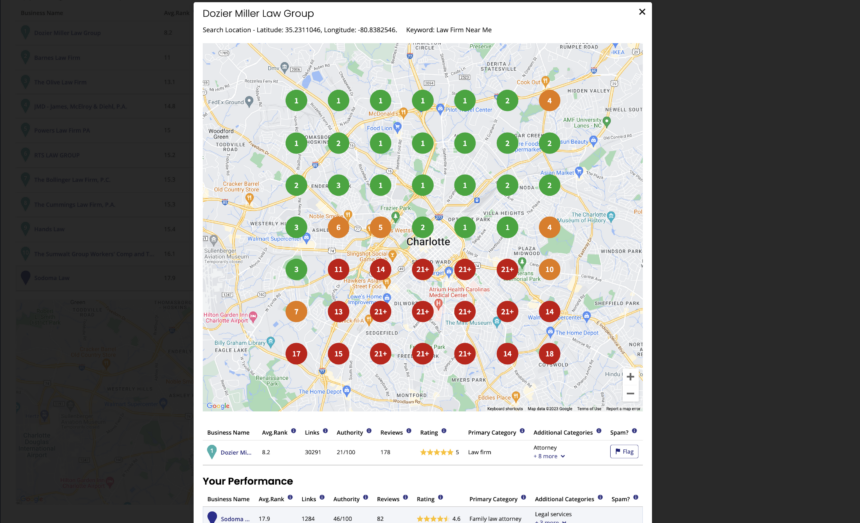
You can also view competitors by grid point. This is useful if you want to learn how you can outrank a competitor for that grid point.
Simply open the keyword tab and click the grid point that you want to investigate further.
A popup will appear showing a list of the competitors and where they are ranking for that keyword in that particular grid point, as well as the following information:
- Proximity: the distance the competitor is from your business in meters
- Reviews: the number of reviews the competitor has
- Rating: the competitor’s star rating
- Category: the Google Business Profile category that they use
You can use this information to get ahead in a similar way to the information in the ‘Overall’ competitors table.
See the below Help Center articles for more information on setting up and understanding a Local Search Grid report:
Your next steps
To get the edge on your competitors, set up these five reports to track their local SEO efforts and plan your next moves.
The BrightLocal Help Center has information on how to create and read all of these reports, and the BrightLocal Insights section on our website has advice on how to improve all aspects of local SEO from link building and review generation to Google My Business optimization.

